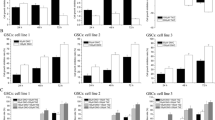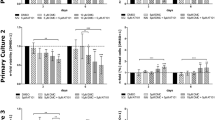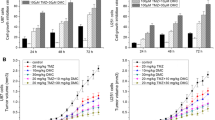Abstract
Temozolomide (TMZ) is widely used in the treatment of glioblastoma multiforme (GBM) as it can effectively inhibit the growth of GBM for some months; however, this cancer type is still incurable. The existence of glioma stem cells (GSCs) is thought to be responsible for the invariable recurrence of GBM after treatment, but GSCs are insensitive to TMZ. Our recent research showed that demethoxycurcumin (DMC), a component of curcumin, was superior to TMZ in its ability to inhibit proliferation and induce apoptosis of GSCs in vitro. In addition, the combined treatment of TMZ + DMC induced more obvious anti-GSC effects. However, in this study, no obvious synergistic anti-GSC effects of TMZ + DMC were found in vivo, while DMC was still superior to TMZ with respect to growth inhibition of GSCs in vivo. Furthermore, immunohistochemistry for proliferating cell nuclear antigen (PCNA) showed that such inhibitory effects were mainly related to the inhibition of cell proliferation rather than to apoptosis. However, a high concentration of DMC (50 mg/kg) alone or combined with TMZ could also induce approximately 10 % of the cells to undergo apoptosis according to a terminal deoxynucleotidyl transferase dUTP nick end labeling (TUNEL) assay. Finally, an investigation of the underlying mechanism revealed that the Janus kinase (JAK)/signal transducers and activators of transcription (STAT) 3 signaling pathway played an important role in the anti-GSC effects. When the JAK inhibitor AG490 was applied, the anti-GSC effects of DMC were enhanced. Taken together, the present work reveals that DMC is superior to TMZ with respect to its anti-GSC effects in vivo, which are mediated through the inhibition of the activation of the JAK/STAT3 pathway; however, DMC demonstrated no synergistic effects with TMZ.



Similar content being viewed by others
Abbreviations
- TMZ:
-
Temozolomide
- DMC:
-
Demethoxycurcumin
- GSCs:
-
Glioma stem cells
- GBM:
-
Glioblastoma multiforme
References
Stupp R, Tonn JC, Brada M, Pentheroudakis G, ESMO Guidelines Working Group. High-grade malignant glioma: ESMO clinical practice guidelines for diagnosis, treatment and follow-up. Ann Oncol. 2010;21(Suppl 5):v190–3.
Clarke MJ, Mulligan EA, Grogan PT, Mladek AC, Carlson BL, Schroeder MA, et al. Effective sensitization of temozolomide by ABT-888 is lost with development of temozolomide resistance in glioblastoma xenograft lines. Mol Cancer Ther. 2009;8(2):407–14.
Athanassiou H, Synodinou M, Maragoudakis E, Paraskevaidis M, Verigos C, Misailidou D, et al. Randomized phase II study of temozolomide and radiotherapy compared with radiotherapy alone in newly diagnosed glioblastoma multiforme. J Clin Oncol. 2005;23(10):2372–7.
Vescovi AL, Galli R, Reynolds BA. Brain tumour stem cells. Nat Rev Cancer. 2006;6(6):425–36.
Braine J, Herpin F. Molecular hydrogen beyond the optical edge of an isolated spiral galaxy. Nature. 2004;432(7015):369–71.
Wan Y, Sun G, Zhang S, Wang Z, Shi L. MicroRNA-125b inhibitor sensitizes human primary glioblastoma cells to chemotherapeutic drug temozolomide on invasion. In Vitro Cell Dev Biol Anim. 2013;49(8):599–607.
Shi L, Fei X, Wang Z, You Y. PI3K inhibitor combined with miR-125b inhibitor sensitize TMZ-induced anti-glioma stem cancer effects through inactivation of Wnt/β-catenin signaling pathway. In Vitro Cell Dev Biol Anim. 2015;51(10):1047–55.
Shi L, Fei X, Wang Z. Demethoxycurcumin was prior to temozolomide on inhibiting proliferation and induced apoptosis of glioblastoma stem cells. Tumour Biol. 2015;36(9):7107–19.
Ruby AJ, Kuttan K, Babu DG, Rajasekharan KN, Kutta R. Anti-tumour and antioxidant activity of natural curcuminoids. Cancer Lett. 1995;94:79–83.
Luthra PM, Kumar R, Prakash A. Demethoxycurcumin induces Bcl-2 mediated G2/M arrest and apoptosis in human glioma U87 cells. Biochem Biophys Res Commun. 2009;384(4):420–5.
Shi L, Sun G, Low-Dose DMC. Significantly enhances the effect of TMZ on glioma cells by targeting multiple signaling pathways both in vivo and in vitro. Neruomol Med. 2015;17(4):431–42.
Darling JL. The in vitro biology of human brain tumors. In: Thomas DGT, editor. Neuro-oncology: primary malignant brain tumors. Baltimore: Johns Hopkins University Press; 1990. p. 1–25.
Shieh JM, Chen YC, Lin YC, Lin JN, Chen WC, Chen YY, et al. Demethoxycurcumin inhibits energy metabolic and oncogenic signaling pathways through AMPK activation in triple-negative breast cancer cells. J Agric Food Chem. 2013;61(26):6366–75.
Ni X, Zhang A, Zhao Z, Shen Y, Wang S. Demethoxycurcumin inhibits cell proliferation, migration and invasion in prostate cancer cells. Oncol Rep. 2012;28(1):85–90.
Hsu YC, Weng HC, Lin S, Chien YW. Curcuminoids-cellular uptake by human primary colon cancer cells as quantitated by a sensitive HPLC assay and its relation with the inhibition of proliferation and apoptosis. J Agric Food Chem. 2007;55(20):8213–22.
Huang TY, Hsu CW, Chang WC, Wang MY, JF W, Hsu YC. Demethoxycurcumin retards cell growth and induces apoptosis in human brain malignant glioma GBM 8401 cells. Evid Based Complement Alternat Med. 2012;2012:396573.
Nie XH, Ou-yang J, Xing Y, Li DY, Dong XY, Liu RE, et al. Paeoniflorin inhibits human glioma cells via STAT3 degradation by the ubiquitin-proteasome pathway. Drug Des Devel Ther. 2015;9:5611–22.
Vuong T, Mallet JF, Ouzounova M, Rahbar S, Hernandez-Vargas H, Herceg Z, et al. Role of a polyphenol-enriched preparation on chemoprevention of mammary carcinoma through cancer stem cells and inflammatory pathways modulation. J Transl Med. 2016;14(1):13.
Wang J, Wang H, Li Z, Wu Q, Lathia JD, McLendon RE, et al. c-Myc is required for maintenance of glioma cancer stem cells. PLoS One. 2008;3(11):e3769.
Peng T, Zhou L, Zuo L, Luan Y. miR-506 functions as a tumor suppressor in glioma by targeting STAT3. Oncol Rep. 2016;35(2):1057–64.
Rahaman SO, Harbor PC, Chernova O, Barnett GH, Vogelbaum MA, Haque SJ. Inhibition of constitutively active Stat3 suppresses proliferation and induces apoptosis in glioblastoma multiforme cells. Oncogene. 2002;21(55):8404–13.
Parajuli P, Anand R, Mandalaparty C, Suryadevara R, Sriranga PU, Michelhaugh SK, et al. Preferential expression of functional IL-17R in glioma stem cells: potential role in self-renewal. Oncotarget. 2016;7(5):6121–35.
Rathod SS, Rani SB, Khan M, Muzumdar D, Shiras A. Tumor suppressive miRNA-34a suppresses cell proliferation and tumor growth of glioma stem cells by targeting Akt and Wnt signaling pathways. FEBS Open Bio. 2014;4:485–95.
Ko YC, Hsu SC, Liu HC, Hsiao YT, Hsia TC, Yang ST, et al. Demethoxycurcumin alters gene expression associated with DNA damage, cell cycle and apoptosis in human lung cancer NCI-H460 cells in vitro. In Vivo. 2015;29(1):83–94.
Ko YC, Lien JC, Liu HC, Hsu SC, Ji BC, Yang MD, et al. Demethoxycurcumin induces the apoptosis of human lung cancer NCI-H460 cells through the mitochondrial-dependent pathway. Oncol Rep. 2015;33(5):2429–37.
Gao Y, Li L, Song L. Expression of p16 and Survivin in gliomas and their correlation with cell proliferation. Oncol Lett. 2015;10(1):301–6.
Tang TK, Chiu SC, Lin CW, Su MJ, Liao MH. Induction of survivin inhibition, G2/M cell cycle arrest and autophagic on cell death in human malignant glioblastoma cells. Chin J Physiol. 2015;58(2):95–103.
Nandi S, Ulasov IV, Tyler MA, Sugihara AQ, Molinero L, Han Y, et al. Low-dose radiation enhances survivin-mediated virotherapy against malignant glioma stem cells. Cancer Res. 2008;68(14):5778–84.
Zhou Z, Sun L, Wang Y, Wu Z, Geng J, Miu W, et al. Bone morphogenetic protein 4 inhibits cell proliferation and induces apoptosis in glioma stem cells. Cancer Biother Radiopharm. 2011;26(1):77–83.
Acknowledgments
This work was supported by the China Natural Science Foundation (81000963, 81370062, 81302196, and 31470853), Jiangsu Province’s 333 Talent Program (BRA2011046), Jiangsu Province “six personnel peak” funded projects (2013-WSN-145/028), Jiangsu Province’s Natural Science Foundation (BK2012670), Medical Research Foundation by Jiangsu Province Health Department (YG201301 and Z201318), the Clinical Technology Development of Jiangsu University (JLY20120053), the Kunshan Social Development Foundation (KS1006, KS1009), and the Suzhou Social Development Foundation (SYS201063). The funders had no role in the study design, data collection and analysis, decision to publish, or preparation of the manuscript.
Author information
Authors and Affiliations
Corresponding authors
Ethics declarations
This study was approved by the ethics committee of the hospital, and informed consent forms were signed by the family members of the patients. All procedures were conducted in accordance with the animal care laws of the First People’s Hospital of Kunshan affiliated with Jiangsu University.
Conflicts of interest
None
Additional information
Liang Leng, Xiaojun Zhong, Guan Sun, and Lei Shi contributed equally to this work.
Rights and permissions
About this article
Cite this article
Leng, L., Zhong, X., Sun, G. et al. Demethoxycurcumin was superior to temozolomide in the inhibition of the growth of glioblastoma stem cells in vivo. Tumor Biol. 37, 15847–15857 (2016). https://doi.org/10.1007/s13277-016-5399-x
Received:
Accepted:
Published:
Issue Date:
DOI: https://doi.org/10.1007/s13277-016-5399-x




